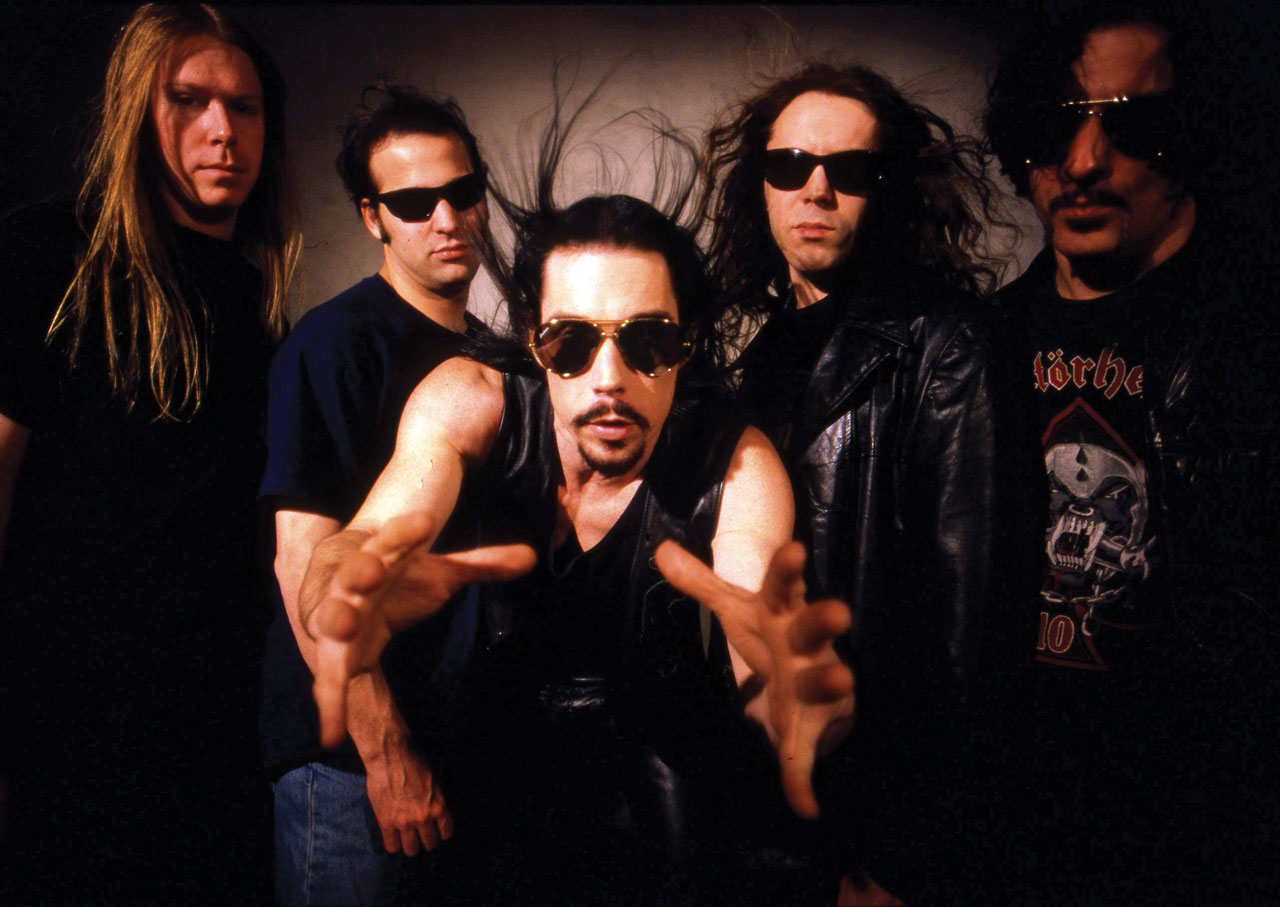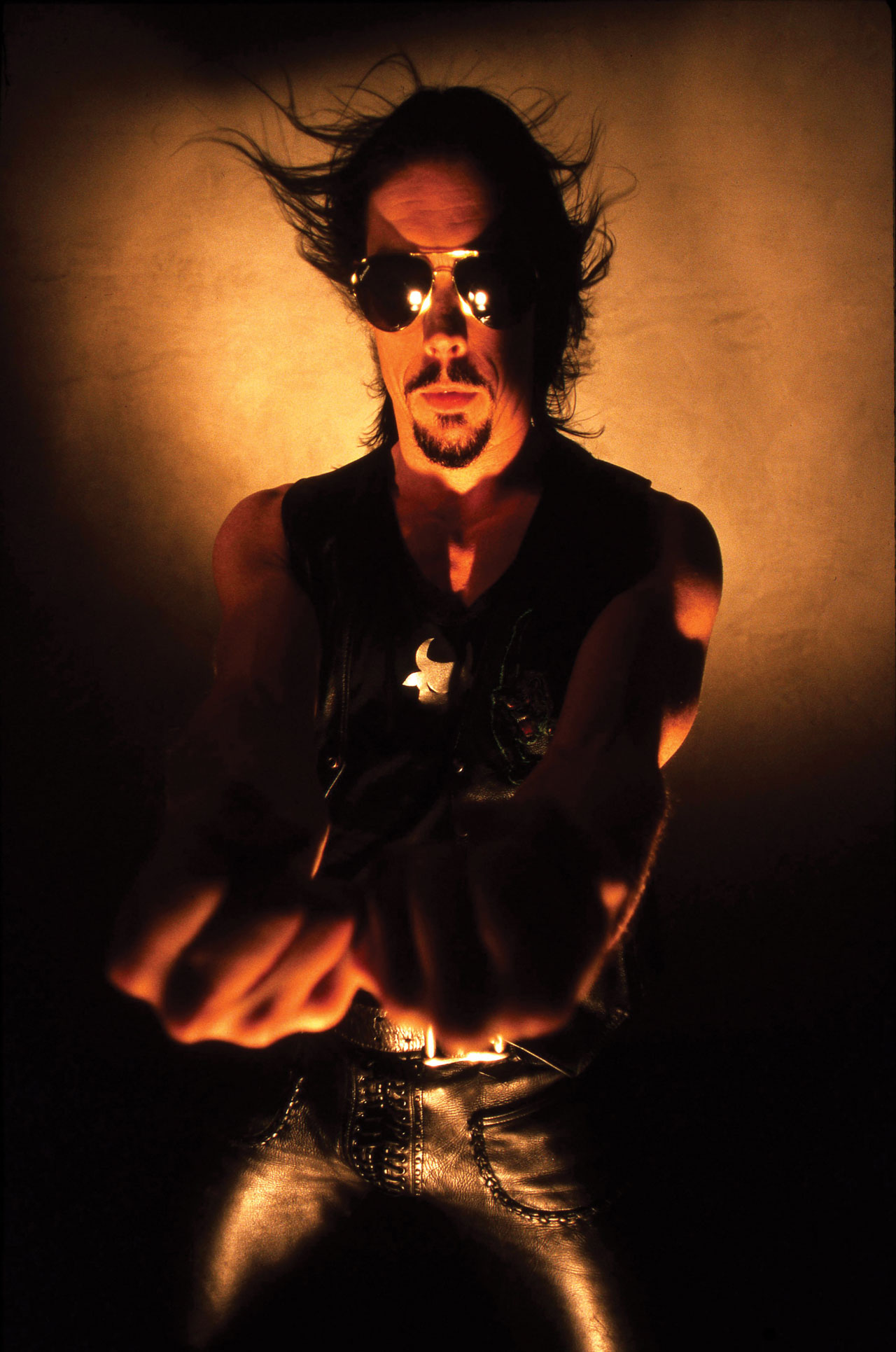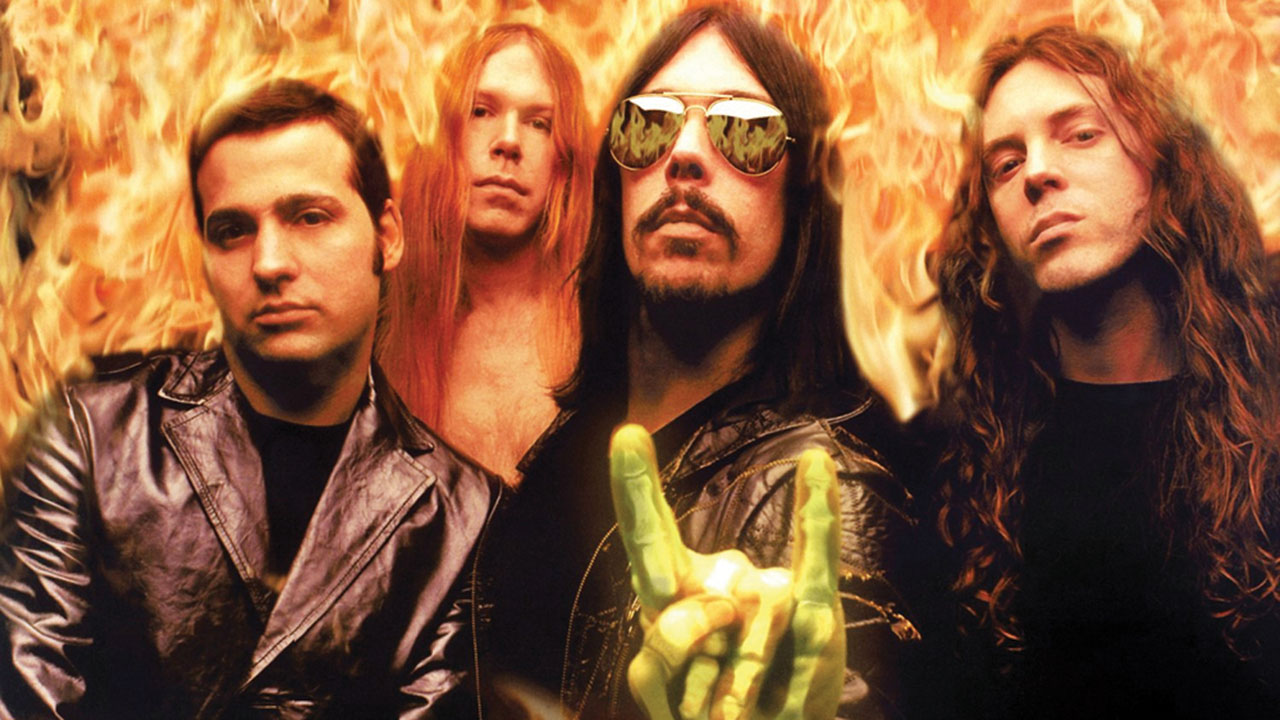It was tough being a rock star in the second half of the 90s. Grunge had swapped the larger-than-life excesses of previous decades for grumbling and heroin, while the best nu metal had to offer was a bunch of whining man-children refusing to tidy their rooms. Luckily for rock’n’roll, Dave Wyndorf was on hand to save it from itself.
“All the bands back then were, like, ‘Yeah, we’re successful but it sucks,’” says the Monster Magnet frontman. “Kurt Cobain killed himself at the top of his game. That was a real bummer. It can’t be that bad being in a successful rock band, right? There’s gotta be some way to laugh through this shit.”
With their fourth album, 1998’s Powertrip, Monster Magnet showed it was possible. The New Jersey band were the last true rock stars of the 90s, and Powertrip’s blockbusting title track was one of the greatest rock’n’roll anthems of any era – a gold-plated, arena-ready monster that rolled with the million dollar swagger of hip hop and offered an aspirational lyrical fantasy that resonated with everyone from street cleaners right up to the President: ‘I’m never gonna work another day in my life.’
Ironically, Monster Magnet were unlikely flag bearers for anything, let alone leather trouser-clad rock’n’roll. They had started life as the frontman’s version of the acid-fried bands he loved as a kid: Sabbath, the Stooges, space-rockers Hawkwind.
“Monster Magnet wasn’t designed in my head to be anything more than a masturbatory indulgence,” he says. “Like, ‘What would my favourite rock band when I was 15 be like?’ But we had ended up on a major label, and you have to perform on a major label.”
The problem was that they weren’t performing. They’d notched up a minor MTV hit with 1995’s Negasonic Teenage Warhead, but bands who sold a lot more records than Monster Magnet were getting dropped. As Dave prepared to start on a new album, he was feeling the burn. “There was a desperation,” he says. “I thought we were gonna get dumped, and I was spooked.”
It was one of the people at the band’s label, A&M, who inadvertently planted the seed for what would come next. “This guy said, ‘Maybe the last record would’ve done better if the songs were shorter and it was less varied.’ I was, like, ‘What the fuck, you’re out of your mind, you should be able to sell anything. Should I just write songs about tits and money?’ So that’s what I did.”

To put flesh on the bones of his vision, Dave decided to go method. Though his band were in a potentially precarious position, he was still a major label artist with major label money behind him.
“I was, like, “You know what I need? A trip to Vegas so I can write the record.’ When was I ever gonna get a chance to do anything like that again? It my chance to live out my [gonzo author] Hunter S Thompson fantasies. If you’re gonna do something, do it right.”
The label agreed and Dave decamped to Nevada, holing up in a hotel room 10 miles from Las Vegas with guitars, speakers, a drum machine and a four- track recorder. He set himself the task of writing 21 songs in 21 days. For inspiration, he would sleep all day then hit Sin City at night.
“I wasn’t getting high and I wasn’t gambling,” he says. “I would just walk around watching people, ’cos Vegas is people-watching heaven. Then I’d go back to the hotel around four o’clock in the morning and write until about eight or nine then pass out and repeat.”
Powertrip itself came early in the process. “I’d been thinking about people I saw, enjoying themselves doing nothing. I’m yelling at these people: ‘Who’s gonna teach you how to dance? Who’s gonna show you how to fly?’ Like, ‘There’s more to life than what you’re doing. I’m desperate over here and you’re walking around fucking sticking coins in slot machines.’”
Those same vacant rubes inspired the song’s immortal lyrical hook. “Those words just came out - ‘I’m never gonna work another day in my life,’” says Dave. “‘Hey, I really don’t wanna work either. I want to be on vacation too.’ That was totally aspirational for me. Do you know how much fun it is to scream, ‘I’m never gonna work another day in my life’ really loud? It feels good!”
The phrase that gave the song its title had been rattling around his head since the previous album. “It didn’t really mean anything, it just sounded cool,” says Dave. “The song should be called ‘I Never Want To Work Another Day In My Life’ – ‘Powertrip’ is just thrown in there. But I thought, ‘I’m gonna use it, I don’t care.’”
But Powertrip had a deeper message than just ‘take this job and shove it.’ At heart, it was a song about reinvention. “I was taught by the records I listened to and the stuff that I read that rock’n’roll was a place where you could reinvent yourself,” he says. “I was a complete nerd in high school. Rock’n’roll was a chance for me to go, ‘Maybe I can switch it up, be something else.’”
Dave himself had joined his first proper band, Ramones-style power-pop punks Shrapnel, in the late 70s, and he had turned 40 by the time he started work on Powertrip. “It just seemed like I’ve lived so many lives and been reborn – old bands, shitty jobs, divorces. I say it in the song: ‘I died a thousand times and I’ll build myself again.’ It’s that reinvention thing again.”

Powertrip didn’t just signify a personal reinvention – it heralded a musical one too. Monster Magnet had marked out their territory as the kings of psychedelic metal across their first three albums, but here they stripped away all the trippiness in favour of a bolshy, anthemic sound that owed less to Sabbath and Hawkwind than it did to 80s arena rock kings The Cult.
“Oh, absolutely,” says Dave of the latter. “Those guys fucking delivered in an age when not a lot of people were delivering. They scratched my itch.”
There was another, more unlikely influence: hip hop. Not necessarily musically so much as attitudinally. “The hip hop guys were the only ones who were acting like the rock bands I knew from when I was a kid.
“You’d see a hip hop video and it was brash and larger than life, then you’d see some lonely grunge guy sitting in his dank basement. Like, ‘Come on, who’s having the most fun here?’”
To record the album, Dave and the band holed up with co-producer Matt Hyde in North Vine Studios in LA. Stevie Wonder had recorded his 1976 soul-funk masterpiece Songs In The Key Of Life there, and the 70s vibe remained intact – the joint was decked out with lava lamps and shag carpets in the lounge. By contrast, Dave embraced everything modern technology had to offer when it came to capturing the songs.
“It was the first record we used Pro Tools. I didn’t need to, but I wanted to see what I could do to make this as supersonic as possible. But it turned out to be a big pain in the ass. My guys were used to playing a little sloppier. I was, like, ‘No, this is hard rock. You gotta fucking bang this shit all the time.’”
The band’s musical turnaround was matched by a visual one. Before Powertrip, Monster Magnet had come across as a bunch of Mephistophelian hippies in greasy jeans and t-shirts, with Dave as King Acid. But he reasoned that if he was going to sing like a rock star, he should look like one too. He hit the gym and decked himself out in a leather waistcoast and strides.
“The whole thing was, like, ‘You know what? Lose some weight and put on some leather pants and see what happens.’ So I put on some leather pants and the band were horrified: ‘What the fuck?’ I was, like, ‘No, no, we gotta go for it.’”
They certainly went for it in the video to the first single, Space Lord. The blinged-up clip featured Magnet living out their hip hop-Vegas fantasies, complete with writhing dancers and sports cars. The promo for Powertrip followed up on that theme, adding the sight of the singer in an inflatable black vinyl body suit for good measure.
“We were so crazed from touring, I didn’t have time to come up with a concept for the video,” says Dave. “And Joseph [Kahn, director] said, ‘OK, just leave it to me.’ So we get there and he’s gone crazy. There’s this inflatable fucking vinyl bat suit: ‘I think this will be a good idea.’ I’m, like, ‘OK, whatever, I’ll get into it.’
Filming the video did have its upsides. At one point, Dave and his bandmates are decked in P Diddy-style white suits and capes while dancers gyrated around them. “The girls who were in it were really friendly and cool. We were basically trying to get dates on the set. And it worked! That’s the thing about rock. It really does work!”
It really did work for Monster Magnet. Released as a single in January 1999, Powertrip gave Monster Magnet their first UK Top 40 hit, while the parent album went on to become their biggest-selling record. Today, Dave puts the songs success down to that unforgettable centre message.
“Some songs are successful ’cause of the music and some are successful ’cause of the words,” he says. “With this one, it’s the words. I think that whole ‘take this job and shove it’ thing, it’s so blatantly obvious. At any moment in anyone’s life, you could walk into a room anywhere and go, ‘I’m never gonna work another day in my life’, and everyone else will go, ‘Yes!’”

